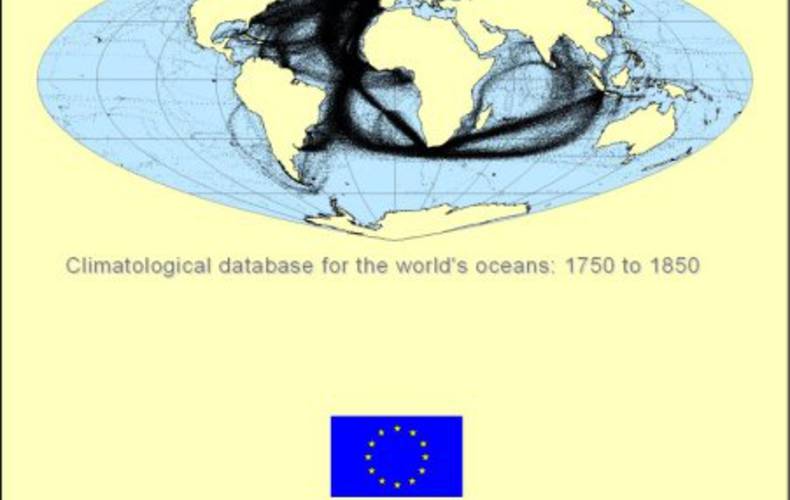
The CLIWOC research project (Climatological Database for the World’s Oceans: 1750 to 1850) was funded by the European Commission as part of its 5th Framework research programme. Work began in 2000 and was completed in 2003, during which time it drew together scientists from the UK, Spain and The Netherlands with participants also from Argentina and the USA. Calling upon the documents in the archives of European nations it demonstrated how historical papers, in this case the logbooks of ships from the long-gone ‘age of sail’, could be used to support and sustain important climatic research. Such logbooks contain a veritable wealth of detailed daily weather observations from all the world’s oceans. From them a picture can be recreated of the climate of those times, which, coming as they did before any significant anthropogenic influence could be exerted on the climate, provide a unique opportunity to explore how the climate of the oceans behaved in ‘natural’ conditions. As such, logbooks offered a unique research possibility. No other source of information or supply of data for oceanic areas matches them for detail and reliability over this time period.
The project was concerned not only to contribute to the science of climatic change but to establish logbooks in their proper place as a new and important source of climatic information for that part of the world for which historical data are in such short supply: the oceans. The information had to be scrutinised with particular care. Much of it is non-instrumental and based on judgements of wind and weather made by experienced senior officers. Scientists have, in the past, been reluctant to acknowledge properly the importance of such data, and the project team had to offer convincing evidence of the integrity of their source. Moreover, this is a truly vast fund of information. Across Western Europe there exist over 120,000 logbooks for the study period, and many more from earlier and later years, but the project team, due the inevitable limitations that time imposed upon them, confined its research to a sample of some 10,000 of those available. Nevertheless, the important database that was produced was designed to accommodate future work in this field by us or by those that follow. The team laid the ground in this field by developing the means and methods with which the raw data, so seemingly non-scientific at first glance, can be rendered in a form of inestimable value for scientific research, the more so because all of the findings and data are freely available on the project website . The project was able to conclude with preliminary conclusions of its own, and demonstrated how, for the first time, wind field patterns from this essentially pre-instrumental age can be reconstructed for the world’s oceans and compared with those from more recent times to gauge the degree and character of climate change. Perhaps most encouraging of all, however, was the high level of public interest aroused by the project, with the demands of the media consuming more time than had been anticipated – but time that was willingly given for this important aspect of modern-day scientific research.
D Wheeler, R García Herrera, FB Koek, C Wilkinson, GP Können, M del Rosario Prieto, PD Jones, R Casale. CLIWOC, Climatological database for the world’s oceans: 1750 to 1850; Results of a research project EVK1-CT-2000-00090
Year: 2007, Publisher: European Commission, Place: Brussels, ISBN: 92-894-8279-6, Pages: 190